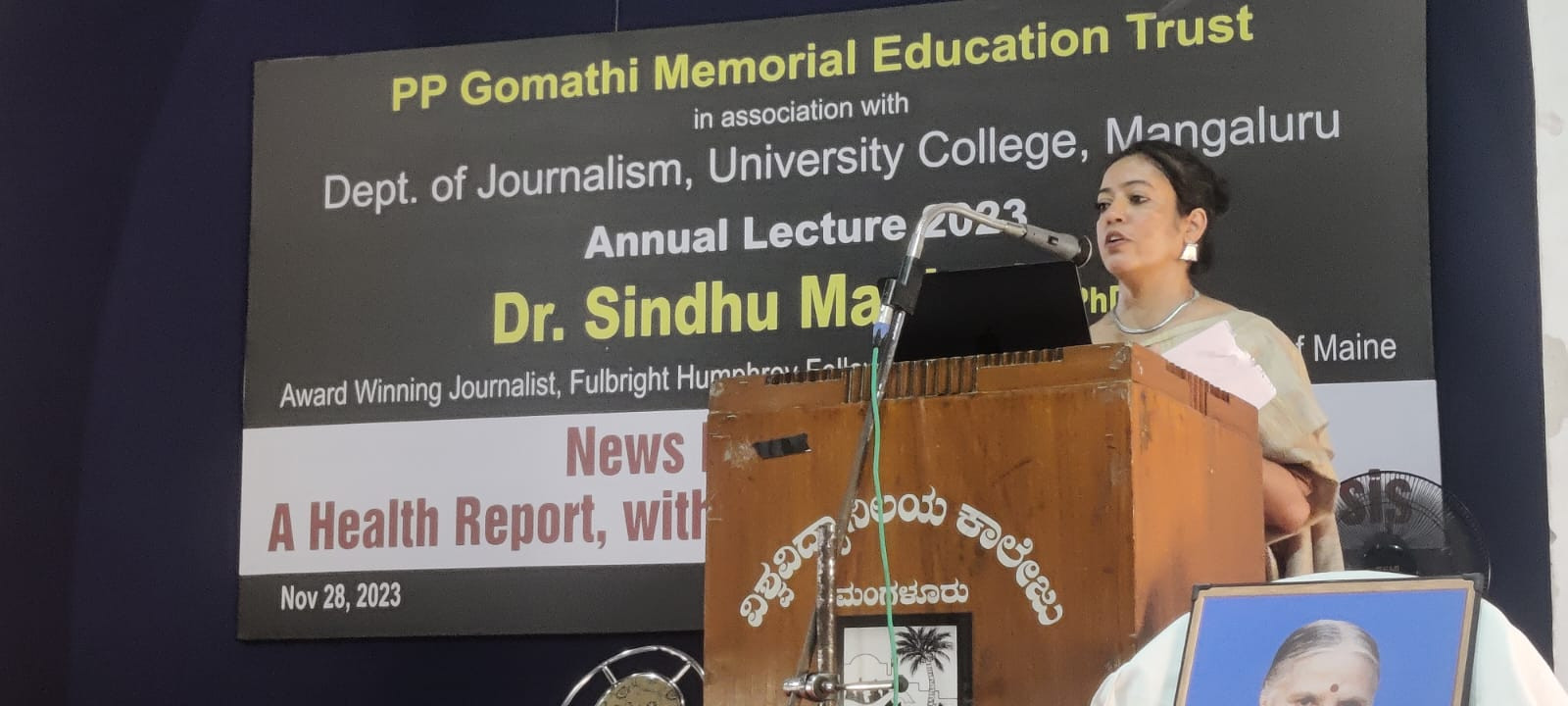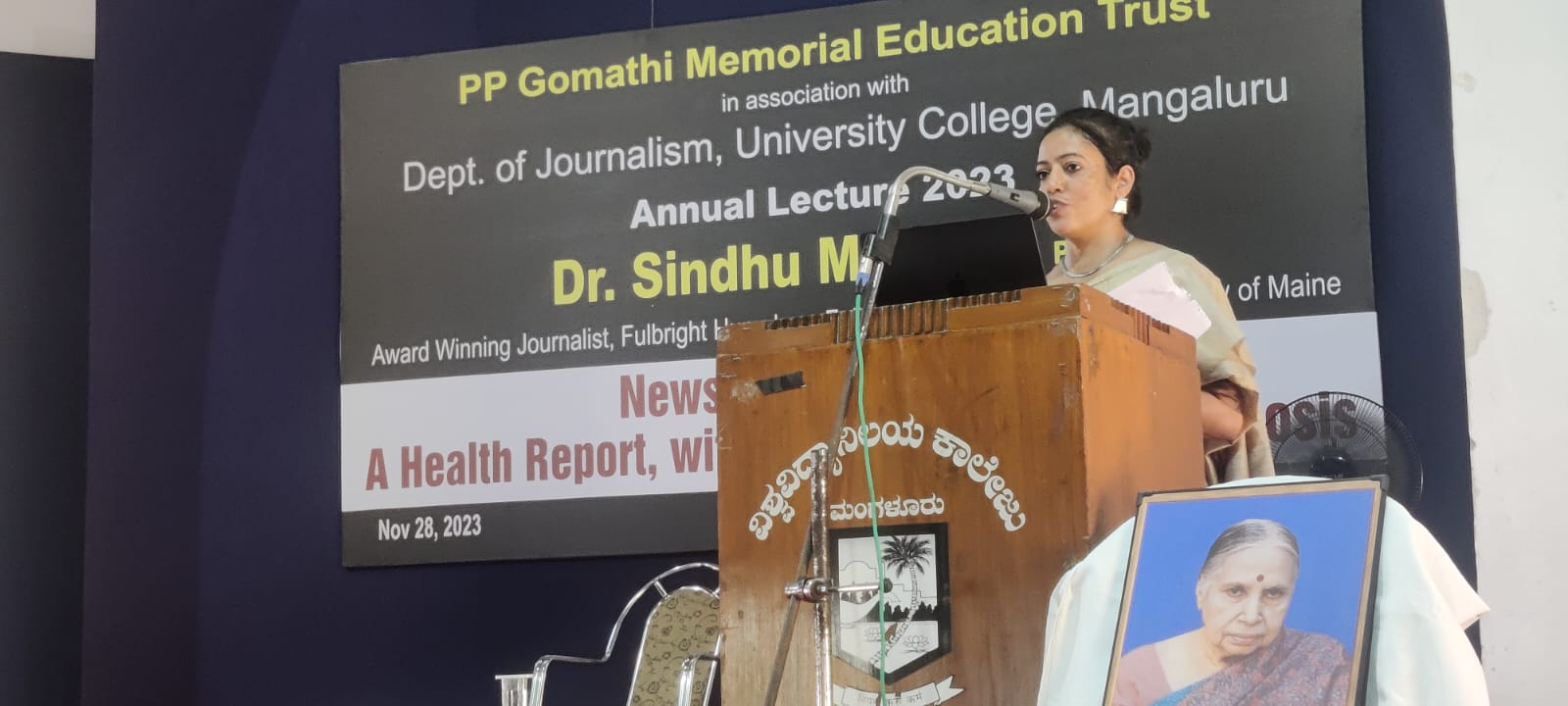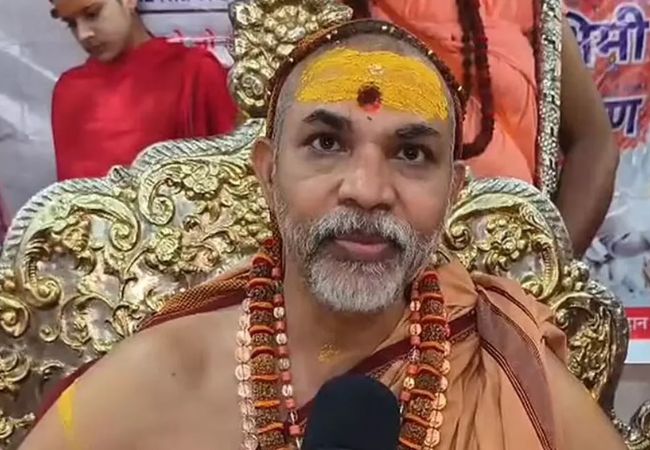Mangaluru: The PP Gomathi Memorial Education Trust, in collaboration with the Department of Journalism at University College Mangaluru, recently hosted its annual lecture at the Ravindra Kalabhavana in the city. The guest for the event was Dr. Sindhu Manjesh, an award-winning journalist, Fullbright Humphrey Fellow, and former Lecturer at the University of Maine.
The lecture, titled "News Media in India: A Health Report, with Special Focus on Prognosis," delved into the current state of the media landscape in the country. Dr. Sindhu Manjesh, known for her insightful analysis and extensive experience in the field, provided a comprehensive overview of the challenges and opportunities facing the Indian news media.
Addressing a diverse audience of students, faculty, and media professionals, Dr. Manjesh critically examined various aspects of the industry, from ethical considerations to technological advancements shaping the media narrative. The special focus on prognosis offered a forward-looking perspective, exploring potential trends and future scenarios for the news media in India.
Dr. Sindhu Manjesh highlighted a fundamental aspect of media's role by emphasizing that it doesn't create knowledge but rather serves as a conduit for sharing existing knowledge. In her perspective, she pointed out that news, a crucial component of media, acts as a vehicle for disseminating information that already exists in society. The news, she explained, plays a pivotal role in influencing public opinions on various matters, which, in turn, can significantly impact decisions such as voting.
Dr. Sindhu Manjesh further presented perspective on journalism, emphasizing its dual nature involving both a profit-oriented aspect and a crucial social responsibility. According to her, journalism extends beyond being a mere business; it carries a distinct social role that should not be compromised, even as media outlets operate as private enterprises.
In her view, journalism is more than a profit-driven profession; it is a service to society. While acknowledging the financial viability and sustainability of media outlets, she spoke about the importance of maintaining a balance between the business aspect and the inherent social responsibility of journalism. The idea is that journalists and media houses, as social institutions, have a duty to serve the public interest by providing accurate, unbiased information that contributes to an informed and engaged citizenry.
Dr. Sindhu Manjesh shed light on the critical distinction between public interest journalism and journalism driven by private sector interests. She drew attention to the concerning trend of declining public interest journalism over recent years and its implications for the news landscape. Her observations centered on the potential consequences when media houses, traditionally seen as platforms for public service and information dissemination, are primarily run by businessmen.
Dr. Manjesh highlighted the diminishing focus on public interest journalism, where media outlets traditionally played a vital role in informing the public about issues that matter to society at large. The decline of this form of journalism could result in a shift away from a broader, more balanced representation of news that serves the interests and concerns of the public.
“The observed trend toward more bias in news reporting was attributed to the decline of public interest journalism. When media outlets prioritize private interests over public service, there is a risk of presenting news through a particular lens, potentially leading to biased reporting. This shift could impact the diversity of perspectives and the depth of information available to the public,” she said.
Dr. Manjesh pointed out a specific challenge when a small number of businessmen or entities own a significant portion of media houses. This concentration of ownership can limit the diversity of voices and perspectives in the media landscape, potentially leading to a homogenized narrative that aligns with the interests of the owners.
She emphasized the crucial role of media consumers in understanding the potential agenda of media houses before consuming news. Her insights touched upon the concerning trend of eroding press freedom in India, with journalists and media outlets facing legal actions using laws initially intended for addressing more severe threats like terrorism, such as the Unlawful Activities (Prevention) Act (UAPA). Additionally, she referred to the declining position of India in the Press Freedom Index, reflecting challenges to journalistic freedom.
She also underscored the critical issue of passive news consumption without due diligence in her discussion. Her perspective revolved around the challenges posed by individuals who consume news without critically questioning the information presented, leading to the reinforcement of pre-existing ideological biases.
She also highlighted the tendency of individuals to consume news that aligns with their existing ideological beliefs without critically evaluating the information. She also called for media consumers to question the credibility of the sources they rely on. By asking critical questions about the reliability, biases, and motivations of media outlets. Dr. Manjesh also advocated for the practice of fact-checking as an essential step in the news consumption process. Encouraging individuals to verify information from multiple sources.
She also pointed out the evolving dynamics of media credibility, particularly in the context of popularity metrics like TRPs (Television Rating Points) and raised concerns over trend of news channels favoring singular points of view and the influence of financial backing on media content.
The lecturer also emphasized that the future health of the media ecosystem depends on the engagement of the public. By actively choosing diverse sources of information, questioning biased narratives, and expressing dissatisfaction with unbalanced coverage, the public can play a crucial role in shaping the trajectory of media practices, she said
The lecture was followed by an engaging question-and-answer session, allowing the audience to interact with Dr. Sindhu Manjesh.
The PP Gomathi Memorial Education Trust and the Department of Journalism expressed their gratitude to Dr. Sindhu Manjesh for her valuable contribution to the discourse on media health in India. Dr Srinivas Kakkilaya welcomed the gathering and introduced Dr. Sindhu Manjesh. Gopal Shetty, Secretary of the trust presented the introduction of PP Gomathi.
Dr. Anasuya Rai, Principal of University College, Mangaluru along with other guests was present during the event.

Let the Truth be known. If you read VB and like VB, please be a VB Supporter and Help us deliver the Truth to one and all.
Lucknow (PTI): The Uttar Pradesh Congress on Wednesday staged a statewide protest demanding a fair and transparent inquiry into the FIR lodged against Swami Avimukteshwaranand Saraswati and those who filed the complaint against him.
In a statement issued here, the party said memorandums addressed to Prime Minister Narendra Modi were submitted through district magistrates in all districts of the state.
Uttar Pradesh Congress spokesperson Manish Hindvi told PTI that the memorandums were handed over through the district administration in all 75 districts.
In the memorandum, the party alleged that Saraswati and his disciples were "unnecessarily harassed and humiliated" by police on the occasion of Amavasya and were prevented from taking a ritual bath (at the Magh Mela). It further alleged that some disciples were manhandled and taken to a police station.
The memorandum also claimed that an FIR was later registered against Saraswati, his disciple Swami Mukundanand Brahmachari and several unidentified persons in a sexual harassment case. It termed the case a "conspiracy" aimed at tarnishing the seer's reputation.
Citing Articles 25 and 26 of the Constitution, the memorandum stated that these provisions guarantee religious freedom and the right of religious denominations to manage their own affairs.
It described the position of shankaracharya held by Saraswati as "one of the highest spiritual posts in Sanatan tradition" and alleged that the entire episode appeared to have been "orchestrated in a planned manner".
"We request that the background of the persons who got the FIR registered be investigated in a transparent manner by a retired high court judge and strict action be taken against them," the memorandum said.
It also sought a "fair and transparent probe" into the allegations levelled against Saraswati so that the truth could be established.
Earlier, Uttar Pradesh Congress president Ajay Rai had told reporters in Varanasi after meeting Saraswati that the party stood firmly with him.
The Congress said it would continue to press for an impartial inquiry into the entire episode.
On February 21, an FIR was lodged in Prayagraj against Saraswati and his disciple Mukundanand Brahmachari on charges of sexually abusing two persons, including a minor, over the past year at a gurukul and religious congregations, including the recently concluded Magh Mela.
Days after he was booked, Saraswati had said on Monday that he would not oppose his arrest and asserted that the "fabricated story" would be exposed sooner or later.
At a press conference on Wednesday, Saraswati alleged that criminals rule in Uttar Pradesh, level allegations and influence investigations, as he denied having any contact with the two persons for whose alleged sexual abuse he has been booked.



_vb_77.jpeg)
_vb_00.jpeg)
